Good news for people
UNICEF records 72% drop in child mortality rate in South Asia
It's one of the greatest-ever achievements in international development. A new report attributes the drop in deaths from 5 million a year in 1990 to 1.3 million a year in 2022 to investments in health workers, better newborn care, improved treatment of childhood illnesses, and increased vaccination uptake. UNICEF
Gavi puts its money where its mouth is
After a spate of delays—some pandemic-shaped—Gavi will now begin funding the two preventive Ebola vaccinations in populations most at risk of exposure. This is a huge achievement, given that there was no approved vaccine at all a decade ago. Gavi is also now accepting funding applications from lower-income countries for supplies of human rabies vaccines for post-exposure prophylaxis.
Women's health is starting to get more attention, finally
The Longitude prize has been awarded to a test that detects a UTI within 15 minutes and identifies the appropriate antibiotic within 45 minutes. Between 50% and 60% of women will experience at least one UTI during their lifetimes; current tests take up to three days. Across the pond, the first state-mandated biorepository has launched in Connecticut, aiming to boost visibility, research, and treatment for endometriosis. Science
Thailand legalizes same-sex marriage
The country's Senate voted 130-4 this week to pass a same-sex marriage bill that the lower house had approved in March. This makes Thailand—home to over 70 million people—the first in Southeast Asia, the third in Asia, and the 38th country in the world to recognize same-sex relationships. It's a 'monumental step forward' in the global fight for equality. CNN

Contraception allows African women more reproductive autonomy
The number of women in sub-Saharan Africa using modern contraception has nearly doubled over the past decade, reaching 66 million. Social media has enhanced reproductive knowledge, even in remote areas, and lower-cost (and importantly, discreet) contraceptives like implants and injections are more readily available. NYT
Biden gives legal protection to half a million immigrants
President Biden announced a significant modification to the pathway to citizenship for 'undocumented spouses' of US citizens. Even the hard-to-impress headline writers at The New York Times described Biden’s action as follows: 'The new policy is one of the most significant actions to protect immigrants in years.'
Yesterday's announcement will make it easier for young people educated in this country, including some Dreamers, to access work visas, which would give them more stability, and in some cases, a path to permanent status. We are a better and stronger nation because of these young people — and this is the right thing to do.
Barack Obama
Pakistan's Punjab receives $150 million for primary education
The World Bank-funded project is expected to benefit five million children through its learning environment reforms, which include scaling up public-private partnerships, improving school preparedness, and enhancing the quality and use of teaching and learning materials and assessments. World Bank
Australia formally grants native title to Kabi Kabi people
A federal judge recognised the Kabi Kabi people's non-exclusive rights to over 365,345 hectares on Queensland's Sunshine Coast, bringing an end to 30 years of campaigning. Justice Collier told the court that the Kabi Kabi people 'have and always have had native title rights and interests in this country' and recognised their right to 'take resources from the area for any purpose.' ABC
Sweden lowers its age to legally change gender
Sweden’s parliament recently voted in favour of lowering the age from 18 to 16 years. The new law is expected to take effect in July 2025 and would simplify the current process by eliminating the need for a gender dysphoria diagnosis. It would also separate the process of changing legal gender from gender surgery, which still requires an age of 18 years. BBC
The great majority of Swedes will never notice that the law has changed, but for a number of transgender people the new law makes a large and important difference.
Progress in reducing world's leading infectious cause of blindness
Trachoma was found almost everywhere in the world in the 1950s. Today, 18 countries have eliminated the eye disease as a public health problem, thanks to improvements in clean water, sanitation, waste management systems, insect control programs, and effective antibiotics, and the number of people at risk has dropped from 228.48 million in 2013 to 132.04 million in 2022. Our World in Data
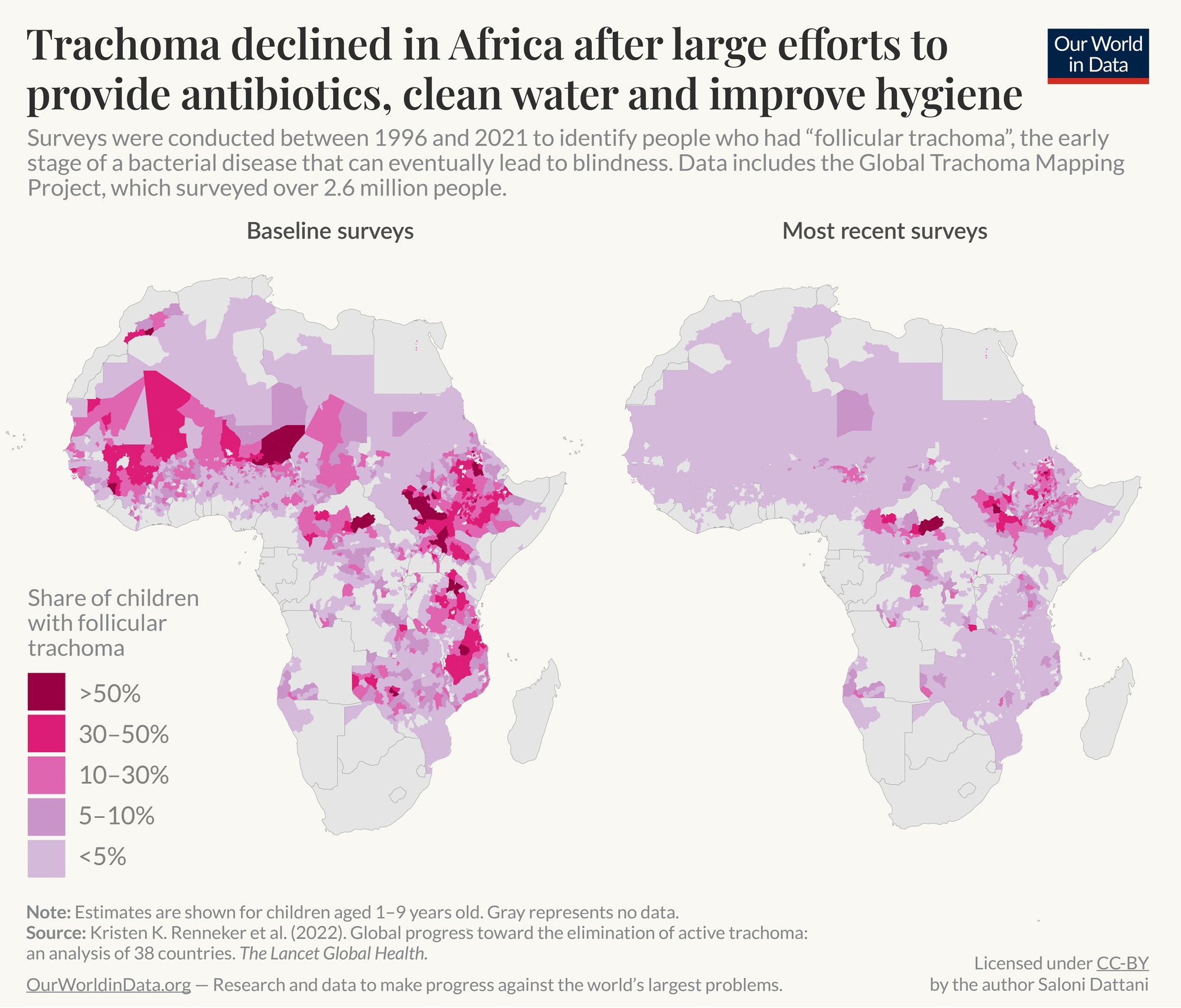
More good news you didn't hear about
The World Bank's new indicator on within-country inequality says that the number of highly unequal countries has dropped from 77 in 2000 to 52 in 2022. The expansion of early childhood development services in Rwanda decreased child stunting from 44% to 33% between 2010 and 2019. The world's real immigration crisis? Not enough immigrants. In the United States, Maryland just pardoned 175,000 people for low-level cannabis possession, New York just passed two laws to protect children from addictive social media content, and a federal judge has blocked Florida from restricting access to healthcare for transgender adults and minors. Europe’s push to lower speed limits has resulted in less noise, lower emissions, and fewer accidents. UNICEF says that global birth registration has risen substantially since 2000. The US Internal Revenue Service’s latest efforts to suppress tax evasion could result in the collection of $50 billion over 10 years. Laos is using digital technology to connect rural women and improve infant and maternal nutrition. USAID has finally put reducing lead poisoning on its agenda. The UN just celebrated its first-ever International Day of Play, and just look at some of those photos.


Help your trans child to thrive
Are you coming to terms with your child being trans or non-binary? Are you worried about how the world will treat them? Research shows that parental support is the biggest predictor of their wellbeing. Our seven-week, online group program gives you in-depth, professional guidance to help you make the best decisions as you support your child. The first module is free. Find out more.

Good news for the planet
EU passes landmark nature restoration law
The hero of this story is rogue Austrian minister Leonore Gewessler, whose last-minute vote saved the proposal. It's a dramatic victory for conservationists, ending a months-long deadlock among member states. The new legislation sets a target to restore at least 20% of the EU’s land and sea by the end of the decade. The Guardian
Today’s decision is a victory for nature. My conscience tells me unmistakably [that] when the healthy and happy life of future generations is at stake, courageous decisions are needed.
Leonore Gewessler
New nature reserve in South Africa’s Drakensberg mountains
The new Northern Drakensberg Nature Reserve will protect 6,500 hectares of vital wetlands, grasslands, and water sources for millions of people and open an important wildlife migration corridor. The new park, which is also home to some of the best prehistoric rock art in the world, was declared in record time thanks to a consensus among local landowners. The Conversation
Animal conservation in the Caribbean is paying off
The Caribbean islands have suffered some of the highest extinction rates in modern history. But over the past three decades, conservationists have worked tirelessly to restore 30 islands and have saved 12 species, including the Antiguan racer, one of the world’s rarest snakes, the White Cay iguana, and the Sombrero ground lizard. BBC
$700 million for the Colorado River
The funding will support projects across the Lower Colorado River Basin, including water distribution structures, desalination, and farm efficiency improvements. The basin provides water for over 40 million people and is a crucial resource for thirty Tribal Nations, two states in Mexico, and agricultural communities across the American West. Phys.org
Deforestation in the Amazon continues to plummet in 2024
Despite a rise in fires, deforestation in the Brazilian Amazon has dropped to its lowest level since March 2018. For the year to date, 1,182 square kilometres of forest have been cleared, marking a 40% decrease from the 1,986 square kilometres recorded at this point in 2023. Mongabay
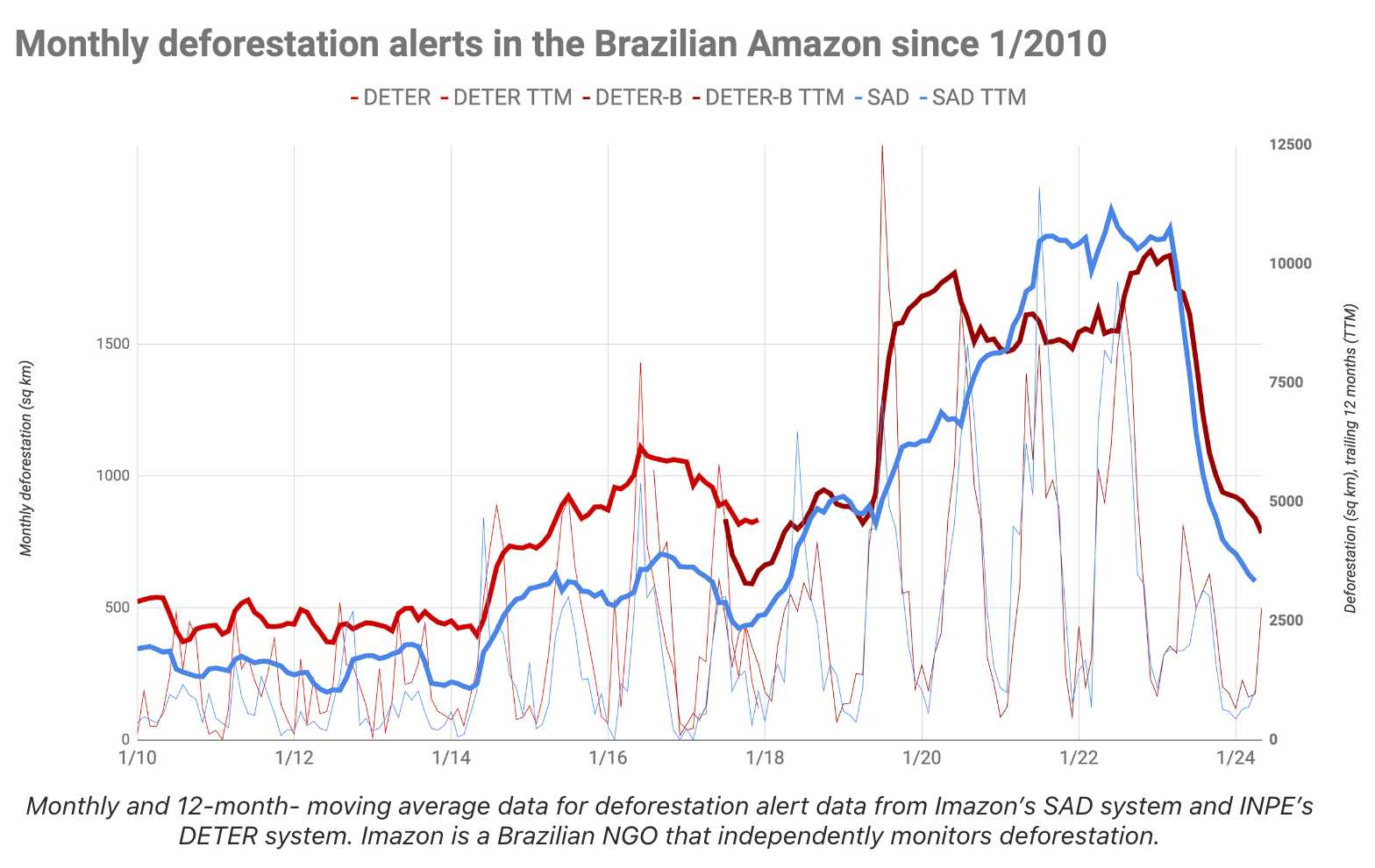
Ecuador is cleaning up its rivers with conveyor belts
A local startup is using conveyor belts to remove plastic from rivers, with the capacity to collect around 80 tonnes of plastic per day. The Azure system stretches across the river to stop objects floating on the surface and extends down 60 cm into the water to allow fish to move freely. It’s a welcome development for a country which has one of the worst plastic waste problems in the region. BBC
The global rise of women-led forest rangers
Much like the team preventing rhino poaching in South Africa, a women-led group of rangers in Indonesia is leading patrols to combat deforestation. They carry no weapons, apart from large blades they use to cut through the forest, and their low-key tactics have been so effective in getting people to change their habits, they’re now sharing their strategies with other women-led groups around the world. AP
Tiger conservation success in Nepal
In the last 15 years, Nepal has tripled its tiger population to 355 thanks to a zero-poaching policy and conservation measures that have doubled forest cover by 45%. The success is benefitting local communities, with Chitwan National Park, home to the largest tiger population in Nepal, now generating 4,000 full-time tourism jobs. World Bank
Endangered caribou habitat is getting protected in Canada
Nearly 200,000 hectares of habitat in northeast British Columbia has been permanently protected in the newly expanded Klin-se-Za/Twin Sisters Park, making it the largest provincial park created in the province in a decade. The Narwhal
One of the most powerful conservation stories of the year
A group of Indigenous women in Peru have won a historic ruling recognising the legal rights of the Marañón River, the main source of the great Amazon. What makes this story ‘nearly transcendent’ is that after decades of patriarchy, it was a female judge of Indigenous descent who listened to the testimony of the women and ruled in favour of the river’s inherent right to life. Common Dreams

More music for those who will listen
How the small Pacific island nation of Vanuatu drastically cut plastic pollution. California's bees and birds will receive increased protections from toxic neonicotinoid insecticides across more than a million acres of fish and wildlife habitat. Brewing giant Heineken just celebrated its first regenerative harvest. The ambitious national plan to rewild Saudi Arabia. How Comoros is leading the way with community-led fisheries. Indonesia’s Social Forestry Program is reducing poverty with forest permits. State-level laws are creating a strong protection framework for domestic animals in the United States. The bee-whisperers in South America saving native bees. A cloud forest in Northern Ecuador is thriving after being granted personhood. The incredible comeback of the Californian condor. Agricultural drones are transforming rice farming in the Mekong River delta, cutting down on the amount of pesticides and fertilizers. The US federal government is dedicating $130 million for abandoned mine reclamation in six states. Can we revive our planet in 20 years? Biologist Sean B. Carroll says we can.
Solarpunk is a valid belief system
Goodbye Big Oil, hello Big Solar
Who makes more energy: the seven largest oil companies or the seven largest Chinese solar panel manufacturers? If you guessed the oil giants, you’re wrong. When you break down how many joules of energy each one provides—and factor in resource efficiency—solar comes out on top, especially considering future investments and equipment longevity. Bloomberg
Clean energy investment way above fossil fuel spend
The world is now investing almost twice as much in clean energy as it is in fossil fuels. Investment in renewables, grids, and storage is set to hit $2 trillion this year, with solar seeing more investment than any other energy resource. Another $500 billion needs to be spent every year for clean energy projects if we’re to hit net-zero by 2050. WSJ
Most new US power is solar, and the projects are getting bigger
This year the United States will turn on the largest amount of new power capacity in two decades, most of which will come from solar, for which the average project is six times bigger than it was a decade ago. That trend isn't slowing down, either. The average project slotted for 2025 is expected to have nearly twice as much capacity as the average project built this year.
Solar is booming in Brazil
The Latin American nation has added about 1 GW of solar every month since 2022, helping it become the sixth-largest solar generator in the world. Public incentives, a production cost decline, and greater ambition to meet the moment got them there, but observers want to see more benefits for disadvantaged groups. Dialogue Earth
Pessimists sound clever; optimists change the world
Over the last two decades, solar pessimists have been spanked by reality over and over, yet somehow they never quit. Because solar became identified with environmentalists and the left, a lot of people decided to downplay it, lest they find themselves on the same team as a bunch of greenies (the horror!). Sadly, they've missed out on the coolest thing happening this century. The Economist
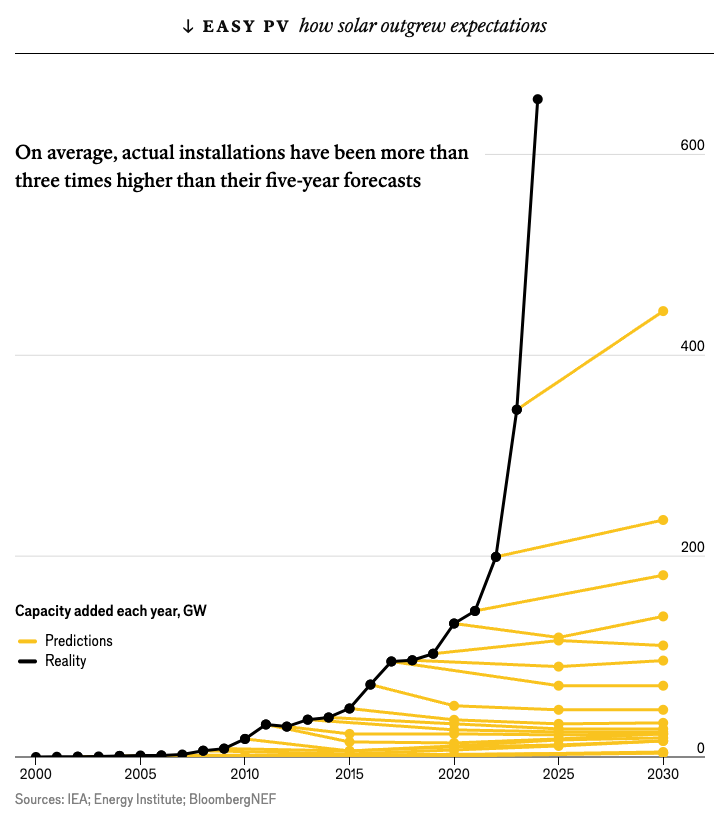
In fact, we're just gonna go and leave this here (and hope you've got a subscription).
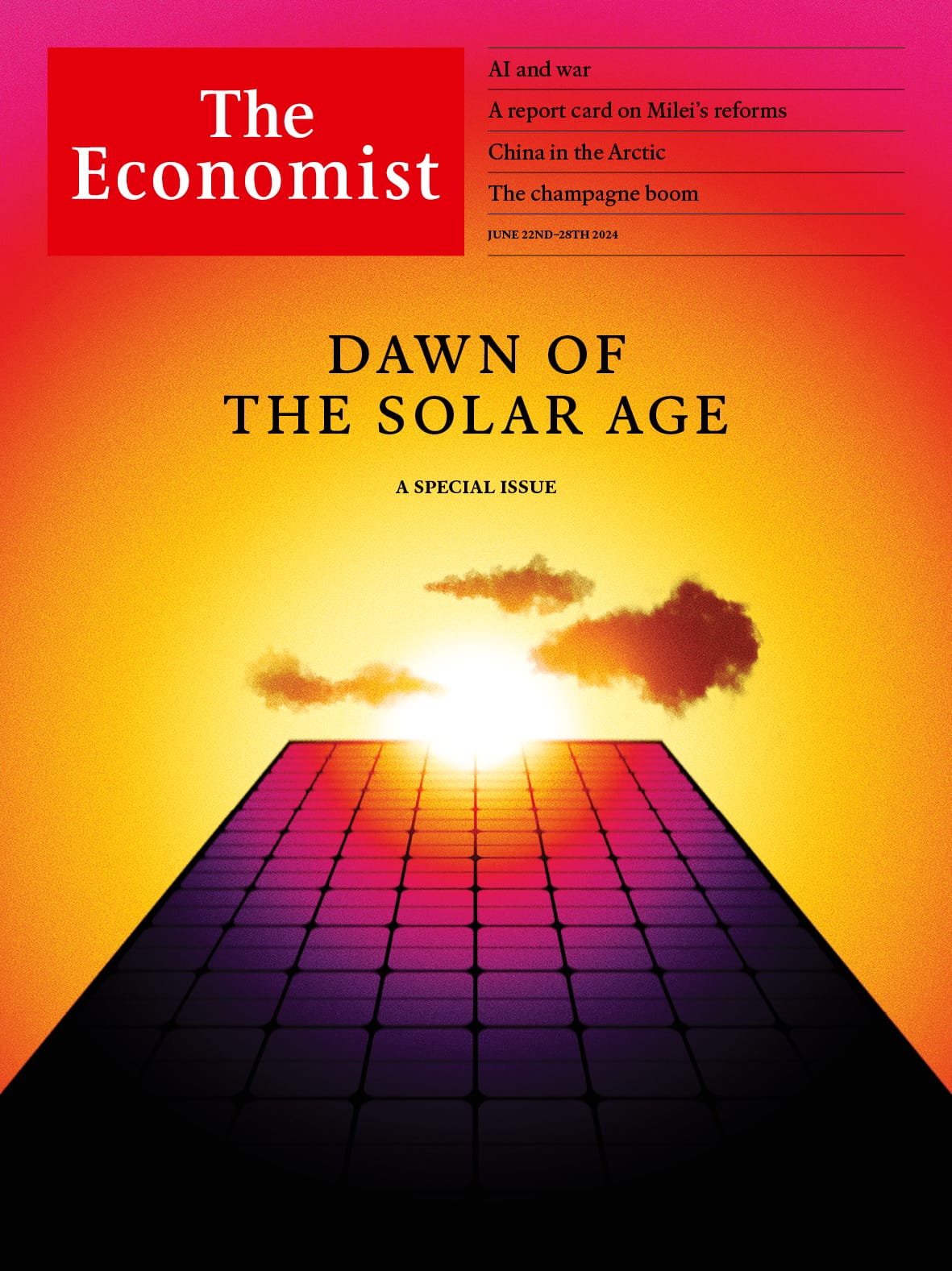
Germany could be on track to hit its greenhouse gas targets
By far the biggest European energy user, Germany wants to reduce its greenhouse gas emissions by 65% by 2030. It’s an ambitious target, and one that’s difficult to hit given lower-than-expected funding, but a new federal analysis suggests the target is now within reach (for the most part) under current climate policies. Clean Energy Wire
China targets industrial emissions
China has announced plans to trim emissions by 84 million tonnes from its ammonia, cement, oil refining, and steel sectors, its four most carbon-hungry industries. As 'the sector with the largest reduction potential' in the country, generating up to 20% of China’s emissions, decarbonizing the steel industry is key to meeting its climate targets.
Offshore wind hits major global milestone
An encouraging new report out of the UK finds global offshore wind capacity has hit 75 GW, rising more than 20% in the past year. China has the most offshore wind projects in the pipeline, at 227 GW, with the UK a distant second at 96 GW, although another 44 GW could be operational in its waters by the end of 2030.reNEWS.biz
US Senate passes bill to support advanced nuclear energy deployment
The Senate voted nearly unanimously Tuesday evening to pass major legislation designed to launch a reactor-building spree. Expanding nuclear power has broad bipartisan support, with Democrats seeing it as critical to decarbonizing the power sector in order to fight climate change, and Republicans viewing it as a way to ensure reliable electricity supply and create jobs.
Defying the 'slowdown,' California's EV sales accelerate
Californians just pushed the state to its best-ever first quarter for zero-emission vehicles, buying roughly 103,000 from January through March of this year. The state government says nearly one in four California car shoppers are now choosing to go electric. All the journalists who wrote about the slowdown will obviously now update their opinions, right?
A new, greener way to make steel
A startup backed by Amazon and steel producer Nucor has produced its first steel plates via a process that dissolves iron ore in a chemical solution, then runs electricity through it at 60°C to separate pure iron from impurities. The breakthrough escalates a potentially lucrative global race to clean up a $1 trillion industry that's responsible for 10% of global emissions. WSJ
A cleaner, greener way to recycle solar panels
Recycling solar panels is a messy business, given the hard-to-remove components and the toxic chemicals involved. An Italian startup is seeing awesome early results with a new method that tackles those issues, even extracting high-value elements. A larger demonstration facility is now under construction as the company hones in on profitability. IEEE Spectrum

What's the opposite of doom-scrolling?
Did you know that two out of three new cars sold in Shenzhen now have plugs, and China's fourth-largest city has more EV chargers than petrol pumps? Hyundai has started construction on a massive hub for EV manufacturing in the US state of Georgia, which will create over 50,000 jobs. A big wave of international climate litigation is coming. Remember when the world wasn't going to have enough lithium? Well, prices are now falling as production catches up. Remember when the world wasn't going to have enough rare earth materials? A Norwegian mining prospector thinks it's found continental Europe’s biggest deposit. Coming very soon: cheap American electric vehicles. If you still think hydrogen is the Swiss Army Knife of energy, then you should probably watch this talk. What will Mexico’s new climate-minded president do for the planet? Don't tell Joe Manchin, but wind technician is still the fastest-growing job in America. 'Look, these batteries are all very nice, but they're never going to work for big vehicles in remote areas... oh hold on.'
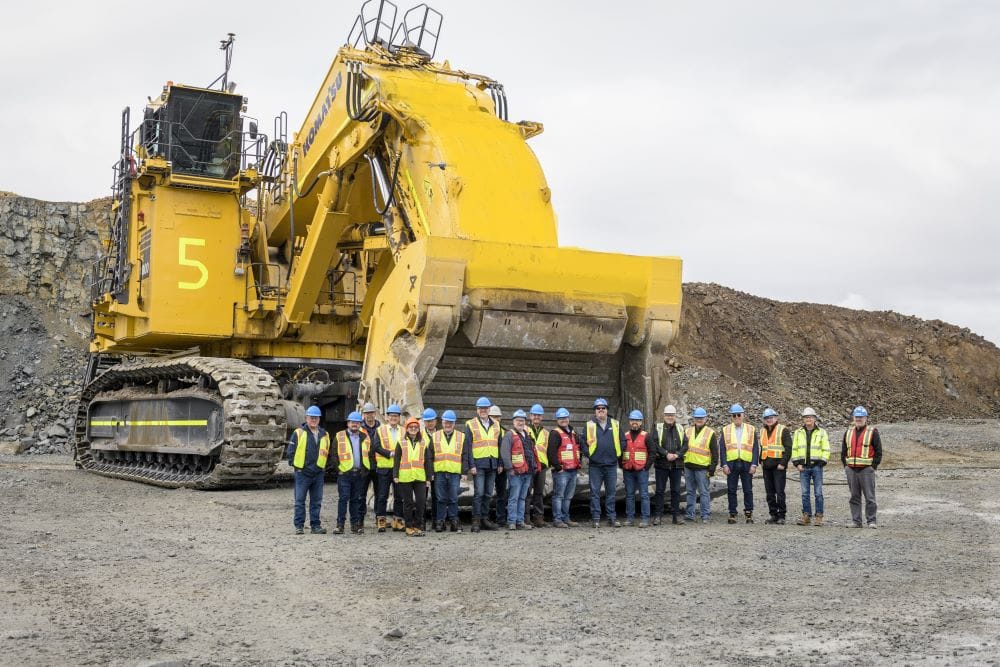
Get even more stories of progress in your inbox. Our premium edition comes with clean energy news (like the section you just read) as well as mindblowing science stories from around the world, and curated articles and videos that we think represent the best of the internet each week. Plus, you'll be supporting small charities making a real difference, simply by subscribing. It's only US$80 a year.
That's all for this week, we hope you enjoyed the bonus energy news. We'll see you next week.
With love,
Gus and Amy



